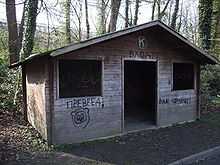Padonkaffsky jargon

Padonkaffsky jargon (Russian: йазыг падонкафф, jazyg padonkaff) or Olbanian (олбанский, olbanskiy) is a cant language developed by padonki of Runet. It started as an Internet slang language originally used in the Russian Internet community. It is comparable to the English language Leet. Padonkaffsky jargon became so popular, that President of Russia, Dmitry Medvedev jokingly suggested Olbanian should be taught in schools.[1]
Origin and etymology
The term Olbanian is an alteration of Albanian, although Albanian is not used to create Olbanian slang.
Learn Olbanian! (Russian: Учи олбанский!) is a popular phrase that was coined in a 2004 incident in LiveJournal when an English language user found a post written in Russian, which he didn't understand and was unable to translate. He asked what language was being used. He was jokingly answered that the post was in Albanian. He questioned why people were posting messages in Albanian by saying:
"Because? It's LIVEJOURNAL. An American website. Not an albanian; (#*!@()! site. Plus, being an American means that the rest of the world should have to cater to me. But that's just mypointofview."
In reaction to this comment, an Internet meme was started, urging the English language user to Learn Albanian! and flooding him with email messages, text messages, and calls to his personal cell phone. Eventually, the English language user wrote an apology in Russian, explaining that he had mastered the Albanian language.
Since then, the request to "Learn Olbanian!" became a friendly response to anyone using incorrect grammar or when saying something that doesn't make sense.
An invitation to "Learn Olbanian!" was directed at Madonna in 2006, when in her blog she used an electronic translator to address her Russian fans and called them "Russian ventilators" by mistake.[2]
Use and development
The language was first developed in 1997 by intellectuals[3] with Internet access who were developing and using open-source software LiveJournal and Russian FidoNet. They were journalists, system administrators and professionals with academic degrees.
The language is based on phonetic spelling of the Russian language and sometimes transliteration of Ukrainian language and often uses profanity. It combines complex orthography with creative use of idioms and literary expression. It is often used to express disagreement,[4] amusement, or to create political satire. It was popularized by the padonki subculture on websites like Udaff.com and Fuck.ru (currently defunct) created by entrepreneur Egor Lavrov and Konstantin Rykov, now a deputy of the Duma.
Padonkaffsky jargon is difficult to translate with a traditional dictionary because many of the misspellings also involve puns and cultural slang. Padonkaffsky language has gone mainstream and is common in Russian vernacular and popular culture. As a result, the websites on which Padonkaffsky language originally appeared are now dominated by another kind of high-shock-value material, adult content.[5]
Notable examples
- On July 6, 2006 in an online conference, Vladimir Putin was asked this question: "PREVED, Vladimir Vladimirovich! How do you regard MEDVED?" This became the most popular question, with 28424 votes.[6] No answer was given, but the Associated Press, reporting on the questions collection process, interpreted Medved as a reference to then-vice-prime-minister Dmitry Medvedev.[7] Another popular question in the same conference was: How does one patch KDE2 under FreeBSD?
See also
- Argot
- Dulya
- Internet slang
- Kaschenism
- Mat (Russian profanity)
- Padonki
- Preved
- Udaff
References
- ↑ Reuters
- ↑ Lenta.ru
- ↑ Учи олбанский!
- ↑ Kleinman, Zoe (16 August 2010). "How the internet is changing language". BBC News. Retrieved 16 August 2010.
- ↑ National Identity in Russia from 1961 : Traditions and Deterritorialisation - Newsletter No. 1 (June 2008) - Albert Baiburin, Iazyk padonkaff
- ↑ "Yandex. Questions to Vladimir Putin" (in Russian). Yandex. 2006-07-01. Retrieved 2008-11-10.
- ↑ "Dmitry Medvedev has been confused with Medved" (in Russian). Lenta.Ru. 2006-07-07. Retrieved 2008-11-10.
| ||||||||